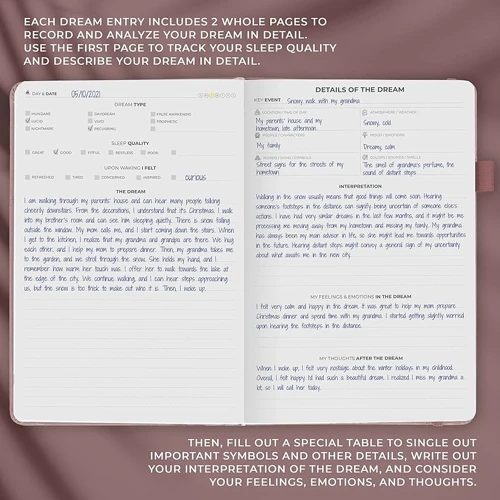Have you ever had a dream that felt so vivid, so meaningful, that you couldn’t shake off the feeling that it held a deeper significance? Prophetic dreams have been experienced and revered by individuals throughout history, across different cultures and religions. These dreams are believed to offer glimpses into the future, serve as warnings, provide guidance, and even facilitate healing. But how do you interpret these prophetic dreams? In this comprehensive guide, we will unravel the power of prophetic dreams, step-by-step. Get ready to embark on a journey of self-discovery and unlock the secrets hidden within your dreams.
What are Prophetic Dreams?

Prophetic dreams are a form of extraordinary dreaming in which individuals receive insights, guidance, or predictions about future events or circumstances. These dreams go beyond the realm of ordinary dreaming, as they often contain symbolism and imagery that holds a deeper meaning. Prophetic dreams can provide information about personal or global issues, offering a glimpse into what may unfold in the future. They can also serve as a channel for receiving messages from higher realms or the subconscious mind. Unlike regular dreams, prophetic dreams are vivid, detailed, and leave a lasting impression upon waking. Many people believe that these dreams are a window into the unknown, allowing us to tap into our innate intuition and gain valuable insights into our lives and the world around us. To better understand and interpret prophetic dreams, it is essential to recognize the signs and symbols they contain, as well as develop techniques for deciphering their meaning.
Signs of Prophetic Dreams

- Vivid and Memorable: Prophetic dreams are often incredibly vivid and leave a lasting impression upon waking. You may find yourself recalling specific details, such as colors, conversations, or locations, with remarkable clarity. This intensity distinguishes prophetic dreams from ordinary dreams.
- Sense of Realism: Prophetic dreams can feel as if they are happening in the present moment, creating a sense of realism that is hard to shake off. You may feel fully immersed in the dream, experiencing sensations, emotions, and even physical touch.
- Strong Emotional Impact: These dreams often evoke powerful emotions and leave a profound emotional impact. You may wake up feeling a range of intense emotions, such as joy, fear, sadness, or curiosity. These emotions can serve as valuable indicators of the significance of the dream.
- Symbolic Imagery: Prophetic dreams often contain symbolic imagery that requires interpretation. These symbols can manifest in various forms, such as animals, objects, numbers, or even people. Paying attention to these symbols and deciphering their meaning is crucial in understanding the message of the dream.
- Repetitive Patterns: If you repeatedly have dreams that contain similar themes, symbols, or outcomes, it could be a sign of prophetic dreaming. Recognizing and analyzing these recurring patterns can provide valuable insights into your subconscious and the messages it is trying to convey.
- Intuitive Feeling: Trusting your gut instinct is essential when identifying prophetic dreams. You may have an intuitive sense that a dream holds a deeper meaning or an uncanny feeling that it relates to future events. Trusting in your intuition can guide you towards a more profound understanding of the dream’s significance.
Interpreting Prophetic Dreams

To successfully interpret prophetic dreams, there are several key steps to follow. First, keeping a dream journal is crucial. This allows you to record your dreams immediately upon waking, capturing important details and emotions. Secondly, paying attention to symbols is essential. Symbols in dreams often hold personal or universal meanings that can provide valuable insights. Next, considering the emotions and feelings experienced during the dream can offer deeper understanding. Additionally, analyzing the context and setting of the dream can provide clues about its meaning. Lastly, seeking professional help, such as a dream therapist or spiritual advisor, can offer guidance for more complex dream interpretations. By following these steps, you can unravel the power of prophetic dreams and gain profound insights into your own subconscious and the world around you.
1. Keep a Dream Journal
Keeping a dream journal is an essential practice for unraveling the mysteries of your prophetic dreams. By recording your dreams immediately upon waking, you can capture important details before they fade from memory. Set aside a journal or notebook specifically for your dreams and keep it by your bed. As soon as you wake up, take a few moments to recall the dream and jot down all the significant elements – images, emotions, symbols, and any other details that stood out. It’s important to be as detailed as possible, even if it seems trivial at the time. Over time, patterns and connections may emerge, providing clues to the meanings of your dreams. Additionally, maintaining a dream journal can help improve dream recall and overall dream awareness, which can greatly enhance your ability to have lucid dreams. If you’re interested to learn about the science behind lucid dreaming and achieving conscious awareness within dreams, consider checking out this informative article here.
2. Pay Attention to Symbols
In the realm of prophetic dreams, symbols play a crucial role in unraveling their hidden meanings. Dreams often use symbols to convey profound messages and insights. When interpreting prophetic dreams, it is important to pay close attention to these symbols and their significance. Symbols can be personal, cultural, or universal in nature, so it is essential to consider your own associations with certain symbols and also explore their broader cultural or archetypal meanings. For example, dreaming of flying can symbolize freedom, transcendence, or a desire for escape. By analyzing the symbols present in your prophetic dreams, you can gain a deeper understanding of the messages being conveyed. Keep a dream journal to record your dreams, including the symbols you encounter, and consult reputable sources or dream interpretation resources to help decipher their meanings. If you want to learn more about the significance of flying dreams, you can explore our article on the significance of flying dreams. Remember, interpreting symbols is an art that requires both intuition and knowledge, so approach it with an open mind and a willingness to explore the depths of your subconscious.
3. Consider Emotions and Feelings
When interpreting prophetic dreams, it is crucial to pay close attention to the emotions and feelings experienced within the dream. Emotions can provide valuable insights into the underlying message and significance of the dream. Take note of how you felt during the dream and upon waking. Were you experiencing fear, anxiety, joy, or excitement? These emotions can offer clues about the nature of the dream and the possible emotions you may encounter in future situations. For example, if you felt a sense of fear or unease in the dream, it could be an indication of a potential danger or warning in your waking life. On the other hand, if you felt a deep sense of peace and contentment, it may signify positive changes or outcomes in the future. By analyzing the emotions and feelings associated with prophetic dreams, you can gain a deeper understanding of their relevance and potential impact on your life. Remember to trust your intuition and instinct when deciphering the emotional content of your dreams.
4. Analyze Context and Setting
When interpreting prophetic dreams, it’s crucial to analyze the context and setting in which the dream takes place. The context refers to the overall situation, events, and characters present in the dream, while the setting encompasses the location, time, and atmosphere of the dream. Understanding these aspects can provide valuable clues about the message or meaning of the dream. Consider the people or figures in the dream – are they familiar or unknown? Are they significant in your waking life? Explore the emotions and interactions within the dream, as they may reflect underlying feelings or relationships. Pay attention to the environment, whether it’s a familiar place or a new setting – this can indicate whether the dream is personal or has a broader significance. Analyzing the context and setting allows you to piece together the puzzle of the dream and unravel its prophetic nature. By delving into these details, you can gain deeper insights and better understand the message or guidance that the dream is conveying.
5. Seek Professional Help if Needed
While you can learn to interpret your dreams on your own, there may be instances where seeking professional help can provide valuable insights into the meaning of your prophetic dreams. Professional dream interpreters, psychologists, or therapists specializing in dream analysis can offer a fresh perspective and guide you in uncovering the hidden messages within your dreams. They have the knowledge and experience to delve deeper into the symbolism, emotions, and context of your dreams, helping you gain a more comprehensive understanding of their significance. Additionally, these professionals can assist in exploring any possible psychological or emotional factors that may be influencing your dreams. If you consistently experience intense or recurring prophetic dreams that leave you feeling confused or unsettled, consulting a professional can provide support and guidance in navigating the meaning and impact of these dreams on your life. Remember that professional assistance is available to help you decode and interpret the profound insights and wisdom embedded in your prophetic dreams.
Types of Prophetic Dreams

Prophetic dreams can manifest in various forms, each with its own unique purpose and significance. One type of prophetic dream is the predictive dream, which offers glimpses of future events or situations that may unfold in a person’s life. These dreams can provide insight and guidance, helping individuals make informed decisions and prepare for what lies ahead. Warning dreams are another type of prophetic dream that serve as a wake-up call, alerting individuals to potential dangers or threats in their life. These dreams often contain vivid imagery and strong emotions that leave a lasting impact on the dreamer. Guidance dreams, on the other hand, offer advice, solutions, or directions for navigating challenges or making life choices. They can provide clarity and guidance during times of confusion or uncertainty. Healing dreams are yet another type of prophetic dream that focus on emotional or physical healing. These dreams can offer solace, clarity, or resolutions to unresolved issues. Lastly, spiritual dreams connect individuals to their spiritual nature and can provide insights into their spiritual path, higher purpose, or connection to the divine. Understanding the different types of prophetic dreams can help individuals recognize their significance and utilize them as a tool for personal growth and transformation.
1. Predictive Dreams
Predictive dreams, as the name suggests, are dreams that provide a glimpse of future events or circumstances. These are perhaps the most well-known and sought-after type of prophetic dreams. In predictive dreams, individuals may see scenes, events, or even receive specific messages that later come true in real life. These dreams can range from small, everyday occurrences to major life events or even global incidents. While the exact mechanism behind predictive dreams remains a mystery, some theories suggest that they could be a product of our subconscious mind processing information and making connections that our conscious mind may not be aware of. Paying attention to the details in predictive dreams is crucial for interpretation and validation, as even seemingly insignificant elements can hold important clues. It is important to remember that while predictive dreams can provide valuable insights, they are not always set in stone and can be influenced by our actions and choices.
2. Warning Dreams
Warning dreams are a specific type of prophetic dream that serves as an alert or cautionary message about potential future events or dangers that need to be heeded. These dreams often evoke strong emotions and feelings of fear, uneasiness, or even terror, making them particularly memorable. They act as a form of psychological preparation, allowing the dreamer to take necessary precautions in order to avoid negative outcomes. Warning dreams can pertain to various aspects of life, including health, relationships, career, or personal safety. For example, a warning dream may involve imagery of a car accident or a fall from a great height, symbolizing potential risks or accidents in waking life. It is crucial to pay close attention to the details, symbols, and emotions present in warning dreams, as they offer valuable guidance and an opportunity to make proactive choices to avoid undesirable situations.
3. Guidance Dreams
Guidance dreams, as the name suggests, are dreams that provide guidance, direction, and support in making decisions or navigating through life’s challenges. These dreams often contain symbols, characters, or scenarios that offer valuable insights and advice. In a guidance dream, you may receive answers to questions that have been troubling you, gain clarity on a particular situation or relationship, or receive inspiration for a new path or endeavor. The messages in these dreams are often presented in a symbolic or metaphorical manner, requiring interpretation and introspection to understand their meaning. It is important to pay attention to the emotions and feelings experienced during the dream, as they can provide additional guidance and insight. To effectively interpret guidance dreams, it is helpful to keep a dream journal, where you can record your dreams, analyze recurring themes or symbols, and reflect on their significance. By tuning in to the wisdom presented in your guidance dreams, you can gain valuable guidance and support on your life’s journey.
4. Healing Dreams
Healing dreams are a unique type of prophetic dream that focuses on emotional, mental, or physical healing. These dreams often manifest as a form of therapy, providing comfort, guidance, and solutions to unresolved issues or traumas. In healing dreams, individuals may experience a sense of release, relief, or even physical sensations of healing. These dreams can help individuals process and heal from past wounds, reconcile relationships, or gain insight into their own inner conflicts. Healing dreams may also offer guidance on how to improve one’s overall well-being or provide suggestions for alternative healing modalities. It’s important to pay attention to the emotions and feelings evoked by healing dreams, as they can provide valuable clues about the areas of life that require healing and growth. When interpreting healing dreams, it’s essential to listen to the subconscious messages and take appropriate actions that promote self-care and emotional well-being.
5. Spiritual Dreams
Spiritual dreams hold a special significance as they provide a connection to the spiritual realm. These dreams often involve encounters with deities, angels, or deceased loved ones, and can leave a profound impact on the dreamer. In a spiritual dream, individuals may receive divine guidance, messages of enlightenment, or a sense of their spiritual purpose. These dreams can offer deep spiritual insights, helping individuals explore and deepen their connection to the divine. They may also provide comfort and reassurance during challenging times, serving as a reminder of the presence of higher powers. Interpretation of spiritual dreams requires an open and receptive mindset, as well as a willingness to explore one’s own spiritual beliefs and experiences. It is essential to pay attention to symbols and emotions within these dreams, as they can hold significant meaning and offer personal spiritual revelations. By analyzing and reflecting upon spiritual dreams, individuals can gain a deeper understanding of their spiritual journey and the connection between the earthly and the divine realms.
Common Symbols in Prophetic Dreams

When it comes to interpreting prophetic dreams, understanding the common symbols that appear can provide valuable insights into their meaning. These symbols often carry universal significance and can be found across various cultures and belief systems. One common symbol is water, which can represent emotions, change, or the flow of life. Fire is often associated with transformation, passion, or destruction. Animals such as snakes, birds, or wolves may symbolize instinct, intuition, or hidden desires. Another symbol frequently seen in prophetic dreams is the presence of numbers, which can carry specific meanings such as dates, quantities, or spiritual significance. Other symbols like doors, keys, or bridges can indicate opportunities or transitions. It is important to note that the interpretation of symbols in prophetic dreams can be highly personal, and the context in which they appear is crucial. Keeping a dream journal and looking for recurring symbols over time can help unveil the unique symbolism present in your prophetic dreams.
Interpreting Prophetic Dreams in Cultures and Religions

Prophetic dreams hold great significance in various cultures and religions around the world. The interpretation of these dreams varies from one culture or religion to another, reflecting the unique beliefs and traditions of each. For example, in Ancient Egypt, dreams were considered to be messages from the gods and were closely tied to the spiritual realm. The Native American culture also places great importance on dreams, viewing them as a means of communication with ancestors and the spirit world. Christianity sees dreams as a medium through which divine guidance and messages can be received. In Islam, dreams are believed to contain signs and symbols that can guide individuals in making important life decisions. Hinduism regards dreams as a means of communicating with the divine and gaining insights into past lives and spiritual growth. Understanding the cultural and religious context in interpreting prophetic dreams can provide valuable insights and perspectives on their meaning and significance.
1. Ancient Egyptian Dream Interpretation
Ancient Egyptian civilization had a deep belief in the power of dreams and their ability to convey important messages. Dream interpretation played a significant role in their culture, as they believed that dreams were a means of communication with the divine. The Egyptians believed that certain symbols and images in dreams held specific meanings and could provide insight into various aspects of life. For example, dreaming of animals such as cats or snakes was seen as a positive sign, representing protection and fertility. Dreams involving the pharaoh or gods were considered highly significant and were interpreted as messages from the divine realm. The Egyptians also believed that dreams could foretell the future, and they would consult dream interpreters or priests to help decipher the messages. These interpreters would consider the context, symbols, and emotions within the dream to provide an accurate interpretation. Dream interpretation was not only limited to individuals but also played a role in guiding important decisions and events within the society. The ancient Egyptians had a deep respect for dreams and their power to offer guidance and revelation.
2. Dream Interpretation in Native American Culture
2. Dream Interpretation in Native American Culture
In Native American culture, dreams hold great significance and are regarded as messages from the spirit world. Native Americans believe that dreams are a means of communication between humans and the divine. They view dreams as a portal to the spiritual realm, where individuals can receive guidance, insight, and healing. Dream interpretation in Native American culture is deeply rooted in the belief that every dream carries a symbolic message that must be decoded. This interpretation often involves identifying key symbols and elements within the dream and connecting them to specific aspects of one’s life or the natural world. For example, animals frequently appear in Native American dreams and are seen as spirit guides or protectors. The specific characteristics and behaviors of these animals are analyzed to determine the message they hold. By paying close attention to the symbols in their dreams, Native Americans gain wisdom, guidance, and a deeper understanding of themselves and their connection to the universe.
3. Dream Interpretation in Christianity
In Christianity, dream interpretation holds significant value and is often seen as a means of receiving divine messages. Throughout the Bible, there are numerous examples of dreams being used by God to communicate with His people. Joseph, the son of Jacob, received dreams that foretold his future rise to power in Egypt, while King Solomon was visited by God in a dream and given wisdom and understanding. Additionally, in the New Testament, Joseph, the earthly father of Jesus, was guided by an angel in a dream to protect Mary and the child from harm. In the Christian tradition, dreams are viewed as a channel through which God can reveal His will, provide guidance, offer warnings, or convey important messages. Dream symbols and imagery in Christianity are often interpreted based on biblical texts and traditions. For example, dreams involving angels may symbolize divine intervention or guidance, while dreams about Jesus may signify a call to follow His teachings more closely. It is believed that prayer, meditation, and seeking spiritual guidance can facilitate the process of interpreting prophetic dreams in the context of Christianity.
4. Dream Interpretation in Islam
In Islam, dreams are considered to be an important source of guidance and divine communication. Muslims believe that dreams can provide insights into the future, offer solutions to problems, and serve as a means of receiving messages from Allah. Dream interpretation in Islam is rooted in the teachings of Prophet Muhammad, who placed great significance on dreams and their potential meanings. According to Islamic tradition, there are certain guidelines and principles for interpreting dreams. One key aspect is the notion of sincerity – it is believed that true dreams come from Allah and are received by individuals who have a pure heart and strong faith. Islamic dream interpretation often involves seeking guidance from knowledgeable scholars or dream interpreters who are well-versed in the teachings of Islam. These interpreters consider various factors such as the symbols, emotions, and context of the dream. It is important to note that not all dreams hold prophetic significance in Islam, and not every dream should be taken as a divine message. However, if a dream is believed to be prophetic, it is seen as a form of divine guidance that should be carefully considered and acted upon accordingly.
5. Dream Interpretation in Hinduism
In Hinduism, dreams are regarded as a significant part of one’s spiritual journey and are believed to contain messages from the divine. Dream interpretation plays an essential role in understanding these messages. According to Hindu tradition, dreams are reflections of an individual’s karma, thoughts, and actions, as well as a means of communication with deities and ancestors. Here are some key principles of dream interpretation in Hinduism:
- Symbolism: Dreams are seen as symbolic representations of various aspects of life, such as gods, goddesses, animals, and natural elements. Each symbol holds a specific meaning and can offer guidance or warnings.
- Divine Intervention: Hindus believe that dreams can be a means through which deities and divine beings communicate with individuals. These dreams may provide guidance, blessings, or instructions.
- Past Life Connections: Hinduism believes in the concept of reincarnation, and dreams are seen as a way to tap into past lives. Dreams can reveal lessons or experiences from previous lifetimes that need to be acknowledged or resolved.
- Karma and Dharma: Dreams in Hinduism are believed to reflect an individual’s karma (actions and consequences) as well as their dharma (righteous duties). They are seen as opportunities for self-reflection and personal growth.
- Dream Rituals: In Hindu culture, specific dream rituals are performed to honor and seek guidance from deities. These rituals involve prayers, meditation, and offerings to invoke divine blessings and interpretation of dreams.
Interpreting dreams in Hinduism requires a deep understanding of Hindu mythology, symbolism, and cultural context. It is also important to approach dream interpretation with reverence, seeking guidance from knowledgeable spiritual leaders or scholars when necessary.
Benefits of Interpreting Prophetic Dreams

Interpreting prophetic dreams can provide numerous benefits and insights into one’s life. Here are some of the key advantages of delving into the world of dream interpretation:
- Self-Awareness: Prophetic dreams can offer valuable insights into our subconscious mind, helping us uncover hidden thoughts, desires, and fears. By interpreting these dreams, we can gain a deeper understanding of ourselves and our emotions.
- Guidance: Prophetic dreams often contain messages or guidance that can help us navigate life’s challenges. By deciphering their meaning, we can receive valuable guidance on decision-making, relationships, career paths, and personal growth.
- Preparation: Prophetic dreams can forewarn us about potential future events or dangers. By interpreting these dreams, we can prepare ourselves mentally, emotionally, and practically for what lies ahead.
- Healing: Prophetic dreams can provide a platform for emotional healing and growth. By exploring the symbolism and messages in these dreams, we can uncover and address unresolved issues, leading to personal healing and transformation.
- Spiritual Connection: Interpreting prophetic dreams can deepen our spiritual connection and enhance our sense of purpose. These dreams can offer profound spiritual insights, connecting us to higher realms and guiding us on our spiritual journey.
By embracing the practice of interpreting prophetic dreams, we open ourselves up to a wealth of knowledge, growth, and transformation. These dreams hold the potential to awaken our inner wisdom and unlock the hidden realms of our subconscious mind.
Preparation Tips for Prophetic Dream Interpretation

Preparing yourself for prophetic dream interpretation is key to unlocking the deeper meaning behind your dreams. One important tip is to practice relaxation techniques before going to sleep. This can help calm the mind and create a conducive environment for receiving and remembering dreams. Another valuable tip is to enhance dream recall by keeping a dream journal beside your bed and making a habit of writing down your dreams immediately upon waking. Developing your intuition and psychic abilities can also aid in understanding prophetic dreams. This can be achieved through practices such as meditation, visualization, and connecting with your inner self. By following these preparation tips, you can cultivate a receptive state and increase your ability to interpret and benefit from the power of prophetic dreams.
1. Relaxation Techniques
To effectively interpret prophetic dreams, it is crucial to practice relaxation techniques to quiet the mind and create a receptive state. Relaxation techniques such as deep breathing exercises, meditation, and progressive muscle relaxation can help calm the body and release any tension or stress that may interfere with the dream interpretation process. Deep breathing involves taking slow, deliberate breaths, focusing on the inhalation and exhalation to induce a sense of calm and relaxation. Meditation, on the other hand, involves finding a quiet space and allowing the mind to enter a state of deep stillness and receptivity. This practice enhances self-awareness and helps in developing the ability to observe and remember dreams more vividly. Progressive muscle relaxation involves systematically tensing and relaxing different muscle groups, promoting physical and mental relaxation. By incorporating these relaxation techniques into your daily routine, you can create a peaceful and conducive environment for interpreting and understanding the messages within your prophetic dreams.
2. Enhancing Dream Recall
Enhancing dream recall is an important aspect of interpreting prophetic dreams. When it comes to remembering our dreams, many of us struggle with retaining the details upon waking. However, there are techniques that can help improve dream recall and allow us to better analyze the content of our dreams. One effective method is keeping a dream journal. In this journal, you can write down your dreams as soon as you wake up, capturing all the intricate details, emotions, and symbols. By regularly recording your dreams, you train your brain to prioritize dream recall, making it easier to remember and interpret future dreams. Another way to enhance dream recall is by establishing a pre-sleep routine, which includes setting the intention to remember your dreams. Before going to bed, repeat to yourself that you will remember your dreams and focus your mind on the desire to retain the dream experiences. Additionally, keeping a peaceful and distraction-free sleeping environment can aid in remembering dreams. Avoiding the use of electronic devices before sleep and practicing relaxation techniques, such as meditation or deep breathing exercises, can also help create a conducive atmosphere for enhancing dream recall. By implementing these strategies, you can improve your ability to remember and interpret prophetic dreams.
3. Developing Intuition and Psychic Abilities
Developing intuition and psychic abilities can greatly enhance your ability to interpret prophetic dreams. Intuition is the inner knowing or gut feeling that guides us without the need for logical reasoning. It allows us to tap into our subconscious and receive intuitive insights. To develop intuition, you can practice mindfulness and meditation to quiet the mind and connect with your inner self. Trusting your intuition and acting upon it in your daily life can help strengthen this innate ability.
Psychic abilities, on the other hand, involve tapping into energetic frequencies beyond our normal senses. They include skills such as clairvoyance (clear seeing), clairaudience (clear hearing), and clairsentience (clear feeling). To develop psychic abilities, regular meditation, energy work, and practicing psychic exercises can be helpful. These exercises can involve activities such as practicing telepathy, remote viewing, or psychic readings.
Developing your intuition and psychic abilities can help you tune into the messages and symbolism in your prophetic dreams on a deeper level. It can aid in deciphering the hidden meanings and understanding the insights they provide. Remember to be patient with yourself and practice regularly to strengthen these skills over time.
Common Misinterpretations of Prophetic Dreams

Common Misinterpretations of Prophetic Dreams can lead to confusion and misunderstanding of the messages they convey. One common mistake is taking every dream as prophetic when it may simply be a reflection of our thoughts, fears, or desires. It is important not to jump to conclusions and assume that every dream has a prophetic meaning. Another misinterpretation is taking dreams too literally. Dreams often use symbolism and metaphorical language to convey their messages, so it is crucial to analyze the underlying symbols and not take everything at face value. Additionally, projecting our own biases and beliefs onto the dream can lead to misinterpretation. It is essential to approach prophetic dreams with an open and objective mind, allowing the true meaning to unfold. Lastly, relying solely on dream dictionaries or generic interpretations can be misleading. Dreams are highly personal, and their meanings are unique to each individual. It is important to consider the context of the dream, the dreamer’s emotions, and their personal associations with symbols to accurately interpret prophetic dreams. By avoiding these common misinterpretations, we can gain a deeper understanding of the messages hidden within our prophetic dreams.
Examples of Prophetic Dreams
Examples of prophetic dreams can be found throughout history, showcasing the power and significance of these insightful dreams. One famous example is the dream of Abraham Lincoln, the 16th President of the United States. Just a few days before his assassination, Lincoln dreamt of walking through the White House, hearing cries of mourning. This dream is believed to have foretold his tragic fate. Another well-known example is the dream of scientist Dmitri Mendeleev, who dreamt of a table with rows of elements arranged in a specific order. This dream inspired him to create the periodic table of elements, revolutionizing the field of chemistry. These examples illustrate how prophetic dreams can provide invaluable guidance, foresight, and inspiration. By paying attention to our own dreams and their potential prophetic nature, we can gain insights that can shape our lives in remarkable ways.
Conclusion
In conclusion, delving into the power of prophetic dreams can be a transformative and enlightening experience. By understanding the signs, symbols, and emotions within these dreams, we can gain valuable insights into our lives, make informed decisions, and navigate through challenges. Keeping a dream journal, paying attention to symbols, analyzing context, and seeking professional help if needed are effective strategies for interpreting prophetic dreams. Additionally, exploring the different types of prophetic dreams, such as predictive dreams, warning dreams, guidance dreams, healing dreams, and spiritual dreams, can provide a deeper understanding of their purpose and significance. It is important to note that cultural and religious interpretations of prophetic dreams may vary, adding layers of meaning to their interpretations. By preparing ourselves through relaxation techniques, enhancing dream recall, and developing intuition and psychic abilities, we can be better equipped to receive and interpret prophetic dreams. While misinterpretations can occur, gaining a deeper understanding of these dreams can lead to profound personal growth and self-discovery. So, embrace the power of your dreams, and unlock the hidden messages that lie within.
Frequently Asked Questions
1. Can everyone experience prophetic dreams?
Yes, everyone has the potential to experience prophetic dreams. While some individuals may be more naturally inclined or attuned to their dream state, with practice and awareness, anyone can develop the ability to receive prophetic insights through their dreams.
2. Are prophetic dreams always accurate?
Prophetic dreams are not always 100% accurate. The symbolism in dreams can be subjective and open to interpretation. It is important to consider other factors and sources of information when trying to understand the meaning of prophetic dreams.
3. How can I distinguish a prophetic dream from a regular dream?
Prophetic dreams often feel more vivid and intense than regular dreams. They may leave a lasting impression and contain symbols or imagery that feels significant or meaningful. Paying attention to these aspects can help distinguish prophetic dreams from ordinary ones.
4. Can I control or induce prophetic dreams?
While you may not have direct control over experiencing prophetic dreams, there are certain practices that can enhance your dream recall and overall dream awareness. Keeping a dream journal, practicing relaxation techniques, and cultivating a receptive mindset can increase the likelihood of having prophetic dreams.
5. How can I interpret the symbols in my prophetic dreams?
Interpreting symbols in prophetic dreams requires a combination of personal understanding and cultural or universal symbolism. Keeping a dream journal, researching common symbols, and reflecting on personal associations with symbols can aid in their interpretation.
6. Are prophetic dreams always literal or can they be metaphorical?
Prophetic dreams can be both literal and metaphorical. Sometimes, the dreams may present events and situations exactly as they will occur in the future. In other cases, symbolic or metaphorical representations are used to convey the underlying message or meaning.
7. Can prophetic dreams be changed or prevented?
Prophetic dreams serve as glimpses into potential future outcomes. While some events may be inevitable, our actions and decisions in the present moment can influence and alter the course of events. Being aware of the messages in your prophetic dreams can empower you to make choices that may change the predicted outcome.
8. How can I document and analyze my prophetic dreams?
Keeping a dream journal is an effective way to document and analyze your prophetic dreams. Write down all the details you can remember, including symbols, emotions, and any significant elements. Over time, patterns and connections may emerge, helping you gain deeper insights.
9. Can prophetic dreams help guide my life decisions?
Yes, prophetic dreams can provide valuable guidance for navigating life decisions. By interpreting the symbols and messages in these dreams, you can gain insights into potential outcomes and make more informed choices in alignment with your higher self.
10. Should I consult a professional dream interpreter for my prophetic dreams?
While it is not necessary to consult a professional dream interpreter for all prophetic dreams, in some cases, seeking guidance from an experienced dream analyst or psychic can provide additional clarity and insights into the meaning and significance of your dreams.








